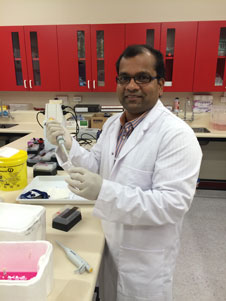 Wednesday 12 August 2015 12:17pm
Wednesday 12 August 2015 12:17pm
Dr Rajesh Katare
University of Otago researchers have discovered why heart disease is the number one killer of people with diabetes, a breakthrough finding opening the way for new treatments to combat the disease in diabetic patients by targeting a key protein.
Diabetes affects more than 365 million people worldwide with rates expected to double by 2030. Recent studies show that at least 60% of people with the disease die because of cardiovascular complications.
Why diabetes takes such a toll on heart health has long remained a mystery. Now, in a new study published in the International Journal of Cardiology, the Otago researchers have identified harmful molecular changes in the cells of diabetic hearts that begin before cardiovascular symptoms even appear.
Using the type-2 diabetic mouse model, the researchers found that a normal cell process called autophagy is deregulated in diabetic hearts. A marked increase in autophagy then triggers activation of pro-cell death proteins, which leads to progressive loss of cardiac cells. As more cells die, cardiac dysfunction develops and heart failure ensues.
Lead researcher Dr Rajesh Katare says the team sought to confirm their laboratory-based results by collaborating with cardiothoracic surgeons at Dunedin Hospital to collect and study heart tissue samples from coronary bypass patients.
The researchers matched around 35 such diabetic patients to comparable non-diabetic ones. Analysis revealed markedly increased autophagy in the diabetic patients' heart tissues compared to the non-diabetic ones.
They also identified that diabetes increases autophagy through activation of the protein (Beclin-1), which Dr Katare says presents “an extremely promising target for new treatments of diabetes-related cardiac disease”.
“We found that these molecular alterations begin in the diabetic heart from an early stage of the disease—before any clinically identifiable symptoms—so blocking them could be useful in combating cardiovascular complications in diabetes.”
When the researchers lowered the gene expression of Beclin-1 in rat heart cells exposed to high glucose, excessive autophagy and cell death rates were much reduced, he says.
“Given that the growing diabetes epidemic is set to create major global economic and social costs in coming decades, it is very exciting to have opened up a new research avenue that could greatly decrease the disease's burden,” Dr Katare says.
The study was supported by research project grants from Lottery Health Research, Heart Foundation of New Zealand and the British Heart Foundation.
For more information, contact:
Dr Rajesh Katare
Senior Lecturer
Department of Physiology and HeartOtago
Otago School of Medical Sciences
University of Otago
Tel 64 3 479 7292
Email rajesh.katare@otago.ac.nz
A list of Otago experts available for media comment is available elsewhere on this website.
Electronic addresses (including email accounts, instant messaging services, or telephone accounts) published on this page are for the sole purpose of contact with the individuals concerned, in their capacity as officers, employees or students of the University of Otago, or their respective organisation. Publication of any such electronic address is not to be taken as consent to receive unsolicited commercial electronic messages by the address holder.
